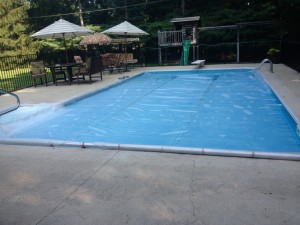 Pools are clearly filled with water; however, they are not big water-wasters as most people might believe. People commonly use far more water inside the home and around the yard than in the pool. Saving water is still important here are some tips to help keep outdoor water waste to a minimum.
Pools are clearly filled with water; however, they are not big water-wasters as most people might believe. People commonly use far more water inside the home and around the yard than in the pool. Saving water is still important here are some tips to help keep outdoor water waste to a minimum.
Keep Your Pool Clean
Emptying and refilling your pool is a huge water-waster. People often do this because of a poor chemical imbalance or an algae infestation. Keeping your pool clean and imbalance can help save gallons of water.
Cleaning your pool regularly will reduce the need to change your filters so frequently. Many people backwash their filters if they get too dirty, and that uses additional water. Therefore, the less you need to backwash your filter, the more water you save. Sometimes it’s necessary to backwash your filter and if you do, reuse the water to water your garden or lawn.
Reducing Evaporation in the Heat
Keeping your pool covered when it is not in use can reduce water evaporation by up to 98 percent. In the hot summer sun, your pool can lose and average of 2.5cm of water per week. That adds up to a huge amount of water loss over the summer season.
Another great way to reduce the amount of evaporation your pool experiences is by lowering the heat. If you have a heated pool, chances are it is adding to the water evaporation. By lowering the heat level even slightly, you can reduce water evaporation and decrease your electricity bill.
Utilizing Your Foliage
The higher the pool temperature and the higher the wind speed, the higher your pool’s evaporation rate will be. It is a great, creative and aesthetically pleasing idea to plant wind-breaking trees, shrubs, or fences. The trees need to be high enough to block wind and also close enough to the pool so it can prevent turbulence in the water. It is also good to be aware that the trees should not be planted too close to the pool that they prevent sunlight and drop leaves in the water.
For other backyard water saving tips, you might want to focus on the garden. The type of plants you choose to have can affect how much water you use. Planting low-maintenance plants can reduce the need for frequent watering, although many pool owners like exotic looking plants that require more water.
Tip of the day: plants can die from over-watering, so be mindful of how often you water your garden.
Helpful water management plan:
- Keep pools clean, filtered, and chemically balanced
- Make sure the water level is half-way up the skimmer opening
- Clean your pool regularly
- Keep all animals out of the pool
- Use a pool cover to reduce evaporation in the heat
- Make sure all pool equipment is working properly
- Discourage water splashing
- Check plumbing for leaks, especially in older pools
- Siphon off excess water after rain
- Upgrade your filter for a more water-efficient model
